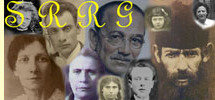



|
"Getting to know more about them" Adolph Blitzer--1889-1978--born in Kudrynce (now Kudrintsy, Ukraine)
Adolph loved learning...many things-- from music, (he attended local operas, as frequently as possible where student tickets were available at nominal costs.) He was an avid reader of philosophy, such as Karl Marx, revered great dramatists and important writers (reading their works in several languages). He cherrished his books which he brought with him. He would love to have played the violin which he began studying when he came to America. He had vision--interested in world affairs and a champion of "working- class " causes. Adolph especially loved animals. He cut out pictures from the newspaper and hung them on the kitchen wall. He was a perfectionist, highly skilled in his craft as a tailor. He was a tailor specialist, you might say, hired to do all the "top stitching" for ladies suits and coats. He could see a garment in a store or magazine, cut a pattern out of newspaper and make an exact duplicate. He loved playing chess and taught anyone who was willing to try. He was a good teacher--patient and encouraging. There was a sense of adventure in Adolph. He always promoted the idea of following one's dream. "The Adventures of Marco Polo" was one of Adolph's all-time favorite movie-story. He loved visiting the Toledo Art Museum, (a Sunday ritual)(4). Frank recalls Adolph carring him on his shoulders--about a 30-45 minute walk. Adolph was also a "health nut", you might say. As children, we felt lucky if we could avoid seeing him at breakfast when he'd be preparing oatmeal (more like mortar) for us. He lectured on the virtues of eating a good breakfast. He would take my older brothers downtown, stop at a Greek store, ask for a shot of "olive oil" to prove its importance for good health and preached the virtues of cod liver oil. He loved children, helped with bathing the boys. He took the boys swimming whenever he could. He would have taught his daughters, too, except Lena, more cautious, said "no". Adolph continued to swim until about the age of 85. 4 He frequented the "shvitz"(5), (a Friday shtetl ritual). My father rejected religious fanaticism, viewing it as " hippocritical", even among Jews. He cited the story of Galileo(6) and the catholic church. He rejected those, who in his opinion, lived a life of religious piety, in direct contrast to their daily dealings with people.(7) Adolph's working experiences in the garment factories, probably fostered these feelings. But Adolph was a Jew through and through. When I was a teenager, we lived next door to a Christian fraternity (Toledo University). I became friendly with one of the boys, who invited me one day for a ride in his car. Adolph, who seldom questioned my "goings and comings", suddenly opened the front door to say I shouldn't go, later forbade my seeing the young man again. Of course, this was during WW II when, as you can imagine, passions against the Christian society were at their highest. All of these qualities, Adolph brought with him to America. He worked hard, trying to achieve the American dream... for himself and his family. Fate, though, patiently waiting, had planned a different course. In time, a chain of events evolved, revealing the scheme it had charted. Adolph did not have the emotional temperment nor political savvy to deal with adversity in the working world. He would welcome intellectuall challenge. But his ideals ( shtetl ethics ) truth and honesty, standards of excellence, were incompatible with capitalism and shrewd business psychology. And as a garmet worker, not an garment employer, Adolph was destined for hard times in the "new land". All in all, Adolph's temperment (high sensitivity leading to frustration--whether over the inequities of work, economic disaster, or even lack of fulfillment in marriage), prevented him from achieving the potential of his talents. He might have been a fine professor had he been given the necessary formal education. But his chances for success as a person were struck down by the loss of his mother when he was so young (she could have brought love to Adolph's affectionate nature)and being left with a less-than parenting father who denied him a secular education. These childhood scars robbed Adolph of self confidence, self esteem, and social savvy. His socialistic idealogies, regarding the working man, were interpreted as anti capitalistic, even communistic. Few of his peers, trying to adopt American principles, let alone survive the Great Depression, would relate to them. Adolph's Chasidic ideals, too, (aesthetic rules for living, born of shtetl philosophy), were out of touch in the America of that time. Uultimately, all of the above played against him. His desire to be respected and accepted for what he was and believed in would evolve as a personal struggle throughout his life....
|
This page is hosted at no cost to the public by JewishGen, Inc., a non-profit corporation. If you feel there is a benefit to you in accessing this site, your JewishGen-erosity is appreciated.
© Copyright 2011 Suchostaw Region Research Group. All rights reserved.
Compiled by Susana Leistner Bloch and Edward Rosenbaum.
Back to SRRG Home Page | Jewish Gen Home Page | KehilaLinks Directory | Gesher Galicia | JewishGen Online Worldwide Burial Registry (JOWBR)
Last updated
02/27/2011 by ELR
Copyright © 2011 SRRG